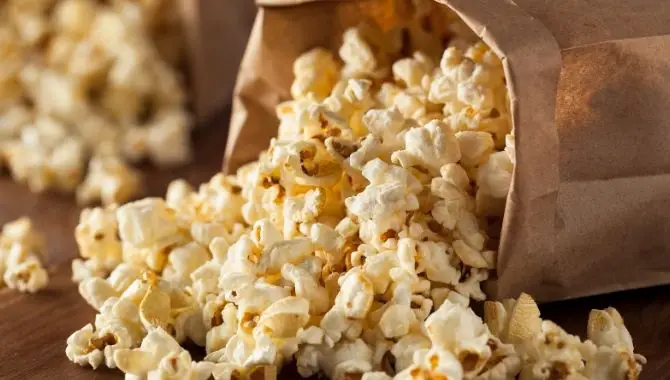Whether you are hosting a party, watching a movie, or just looking for something to snack on, you can never go wrong with kettle corn. The name comes from the fact that it was traditionally made in cast iron kettle. The corn, oil, salt, and sugar were cooked together to produce a noticeable sweet crust on the kettle corn.
While the method of preparation is typically the same to date, other types of pans and pots are being used. Keep in mind that this method of preparation requires constant stirring to keep the sugar from burning. But before we get into the specifics, we need to answer one important question.
Is kettle corn vegan? Well, it is prepared from corn kernels in vegetable oil, and seasoned with salt and sugar. As you can see, no animal products or by-products are involved in the making of kettle corn, which makes them vegan-friendly. Some brands that make them commercial may, however, include non-vegan ingredients so make sure you read the ingredients list before purchase.
A common misconception about a vegan diet is that you only get to eat salads, but this couldn’t be further from the truth. In fact, with the growing wave of vegan junk foods, you no longer have to give up on your favourite foods. Thanks to modern food technology, there are plant-based alternatives to virtually all animal-based foods. There’s no longer an excuse to contribute to the suffering of animals. In today’s text, I’m going to cover one of the most popular snacks on the planet, by outlining when it’s vegan and when it’s not, among other things. Without much delay, let’s get started:
The Vegan Status of Kettle Corn
Thanks to its unique sweet and salty taste, kettle corn has become one of the most sought-after treats at outdoor festivals, in movie theatres, at birthday parties, and even something to snack on during the day. With this much popularity, this sweet and savoury snack can be found in nearby grocery stores.
How Is It Made?
For a product to be considered vegan, it should be made without any animal product or by-product. The old-fashioned kettle corn is easy to make as it requires four basic ingredients: kernels, oil, sugar, and salt. Start by heating the oil with three or four kernels in a pot on a stove. Once the kernels begin to pop, add the remaining along with sugar. Salt is often added to the warm kettle corn after transferring it to a bowl, but you can also add it along with the kernels and the sugar. As you can see, there’s no use of any animal product or by-product, which makes kettle corn a vegan-friendly snack. Unless, of course, the vegetable oil was previously used to make animal products like fried chicken or fish fillets, in which case it will not be vegan-friendly.
Is The Sugar In Kettle Corn Vegan-Friendly?
Sugar is a controversial ingredient in the vegan world. That’s because it’s often purified with bone char, which is derived from charring animal bones, to give it the pure white colour.
The good news is there are more vegan-friendly ways to purify sugar and many manufacturers are exploring them to make their sugar suitable for all vegans. The problem is several brands make store-bought kettle corn and it’s difficult to tell what kind of sugar they use to make their products. The only way to be sure is to reach out to them and ask where they source their sugar from. You’ll then have to research whether that particular sugar company uses a vegan-friendly filtering agent or not. This might seem like a lot of work for many, which is why most vegans choose not to judge otherwise vegan foods that contain sugar. However, for stricter vegans, the presence of refined sugar makes a food product non-vegan.
Common Non-Vegan Ingredients in Kettle Corn
While kettle corn is traditionally vegan-friendly, some brands choose to add animal-based ingredients that make them unsuitable for vegans.
For starters, some kettle corn recipes call for sweetening with honey instead of sugar. Veganism is all about avoiding or minimising all forms of animal exploitation, and that includes not consuming honey as it is from bees.
Some commercials brands add dairy products like cheese and butter to give it a buttery flavour. Dairy products are a no-no for vegans. These animals are kept in a permanent state of pregnancy so they keep producing milk all while living in confined spaces never to see the light of day. Once they have outlived their usefulness, they are slaughtered for meat. Consuming kettle corn with dairy products contributes to the increasing demand for dairy products, which means more torture to the animals.
To ensure 100% vegan kettle corn, it’s best to make yours at home. Don’t be afraid to experiment with your favourite vegan spices and herbs.
Kettle Corn VS Popcorn
Kettle corn and popcorn may seem interchangeable at a glance but contrary to popular belief, the two are quite different in a number of ways, including:
Method of preparation
They both make use of a special type of corn that puffs up and bursts open when exposed to heat. However, kettle corn is typically prepared in a cast-iron kettle, a pan, a pot, or a Dutch oven. All the ingredients are placed in the kettle together and heated. You must stir continuously to prevent sugar from burning.
Regular popcorn, on the other hand, can be prepared in a variety of ways. Popcorn can come pre-packaged, allowing you to prepare them in a microwave, an oven, or using the air-popping machine.
Flavour
Kettle corn has a rich, caramelized flavour as the oil picks up the sweet flavour from the sugar. Salt is also crucial to the mixture but just a hint is used. Regular popcorn, on the other hand, is generally considered a salty snack since it’s often flavoured with salt and butter, but other popular flavours include chilli, barbecue, cheese, cinnamon, and caramel.
Nutritional value
While this is dependent on what’s added during and after the cooking process, kettle corn has a high sugar content that can be bad for people with high blood sugar. As for popcorns, it will depend on the method of preparation as well as the topping and seasonings added. The air-popped variants are generally healthy and rich in antioxidants as they are lightly seasoned with salt. Even so, the ones served in theatres are typically popped in oil and have a butter or margarine topping along with a large amount of salt.
Best Vegan Kettle Corn
Although there’s likely more out there, I found the following kettle corns to be suitable for vegans. Keep in mind that the nutrition labels and ingredients list change from time to time, which means you must always double-check before buying.
Popcornopolis Kettle Corn
If you are looking for big kernels of crispy popcorn covered in just the right amount of salt and sugar, then this is your best bet. They make use of just four ingredients that are not only vegan-friendly but also gluten-free and GMO-free.
Angie’s BOOMCHICKAPOP Sweet & Salty Kettle Corn
This kettle corn is made with real, simple ingredients, which include popcorn, real cane sugar, sunflower oil, and sea salt.
Trader Joe’s Kettle Corn
Trader Joe’s went for a more subtle taste with these kettle corns as they are neither too salty nor too sweet. The kernels are remarkably large all while being light and fluffy. The perfect balance of sweet maple flavour and salt is what makes them unique.
365 Organic Sweet & Salty Kettle Corn
Their kettle corn is made with only organic ingredients, including popcorn, sugar, sunflower and/or safflower seed oil, soy lecithin, and salt. Just like the ones above, these also offer the perfect balance of salt and sugar.
Is Kettle Corn Healthy?
Corn kernels, which are the base ingredient in kettle corn, are whole grains and have the following nutritional benefits:
- High in fibre: This is good for digestive health and for promoting regular bowel movements.
- Antioxidants: These are substances that protect your body cells from free radical damage. A diet rich in antioxidants has been found to reduce the risk of serious diseases like cancer and heart disease.
- Contains proteins: The body needs proteins for many processes, including building and repairing body tissues and cells
- Contains vitamins and minerals
Kernels are also naturally low in calories and fat. However, due to the added sugar, oil, and salt in kettle corn, they may not the healthiest food choice. As with most foods, homemade versions are healthier than the store-bought ones as manufacturers tend to add more oil, sugar, and salt than you would normally add in your kitchen. Regardless of what type of kettle corn you choose, remember to enjoy them in moderation.
Welcome to VeganClue - My name is Robert Van De Ville and together with my team we spent hundreds of hours researching the most relevant topics for Vegans and non yet Vegans. Are you looking for more information about Veganism, animal welfare, diet, health, and environmental benefits of the Vegan lifestyle? You are in the right place! Enjoy the site.

